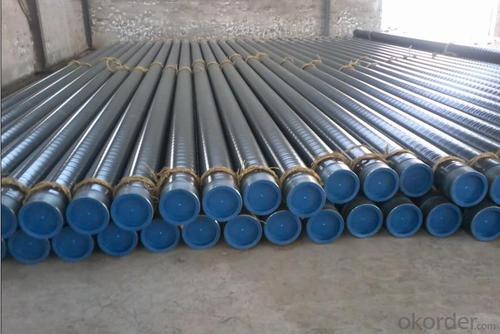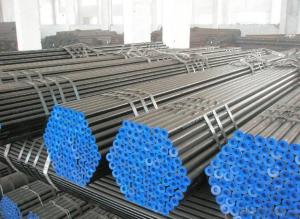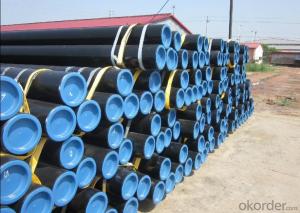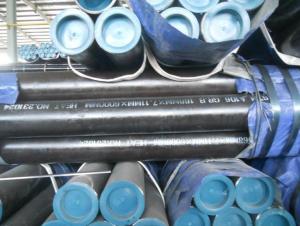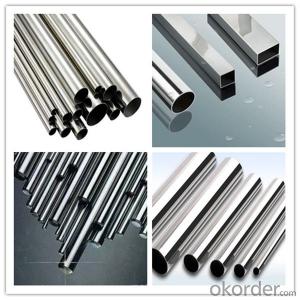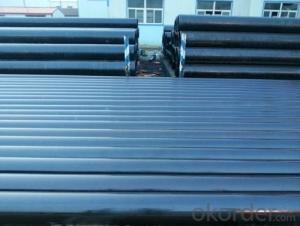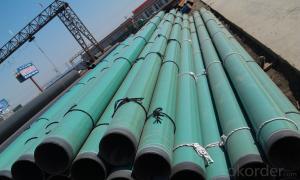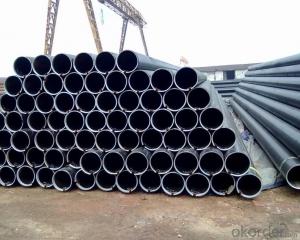Seamless steel pipe good quality16mn 20# GB5310
- Loading Port:
- Tianjin
- Payment Terms:
- TT or LC
- Min Order Qty:
- 20 m.t.
- Supply Capability:
- 9000 m.t./month
OKorder Service Pledge
OKorder Financial Service
You Might Also Like
● Full series of products provides an easier access for one stop purchase
▲ Line pipe
▲ Tubing and casing
▲ L & M & H boiler tube
▲ Gas cylinder tube & pipe
▲ Mechanical & Structural pipe
▲ Ship-building tube & pipe
▲ Automobile tube & pipe
1、Structure of Seamless Pipe ASTM A106/53:
Seamless pipe is formed by drawing a solid billet over a piercing rod to create the hollow shell. As the manufacturing process does not include any welding, seamless pipes are perceived to be stronger and more reliable. Historically seamless pipe was regarded as withstanding pressure better than other types, and was often more easily available than welded pipe.
Standard: GB5310: Seamless Steel Tubes And Pipes for High Pressure Boiler
● Application: For manufacture heating-pipelines, containers, coal-saving devices, super heaters and reheaters
of high pressure boilers(P>9.8Mpa,450℃<T<650℃)
● Steel Grade: 20G、20MnG、15MnG、15MnG、12Cr2MnG、12Cr1MoVG (etc),Other grade can also be provided
after consulting with customers.
2、Main Features of the Seamless Pipe ASTM A106/53:
• High manufacturing accuracy
• High strength
• Small inertia resistance
• Strong heat dissipation ability
• Good visual effect
• Reasonable price
3、Seamless Pipe ASTM A106/53 Specification:
Standard | GB, DIN, ASTM ASTM A106-2006, ASTM A53-2007 |
Grade | 10#-45#, 16Mn 10#, 20#, 45#, 16Mn |
Thickness | 8 - 33 mm |
Section Shape | Round |
Outer Diameter | 133 - 219 mm |
Place of Origin | Shandong, China (Mainland) |
Secondary Or Not | Non-secondary |
Application | Hydraulic Pipe |
Technique | Cold Drawn |
Certification | API |
Surface Treatment | factory state or painted black |
Special Pipe | API Pipe |
Alloy Or Not | Non-alloy |
Length | 5-12M |
Outer Diameter | 21.3-610mm |
Grade | 20#, 45#, Q345, API J55, API K55, API L80, API N80, API P110, A53B |
Standard | ASME, ASTM |
1) Material:20#(ASTM A 106/A53 GRB.API5LGRB,GB),45#,16Mn,10#.
2) Specification range:OD:21.3-610mm,WT:6-70mm,length:6-12m or according to the requirement of clients.
3) Excutive standards:GB,ASME API5L.ASTM A 106/A53,Despite of the above standards,we can also supply seamless steel pipe with standard of DIN,JIS,and so on,and also develop new products according to the requirements of our clients!
4) Surface:black lacquered,varnish coating or galvanized.
5) Ends:Beveled or square cut,plastic capped,painted.
6) Packing:bundles wrapped with strong steel strip,seaworthy packing.
4、Packaging & Delivery
Packaging Details: | seaworthy package,bundles wrapped with strong steel strip |
Delivery Detail: | 15-30days after received 30%TT |
5、FAQ of Seamless Pipe ASTM A106/53:
①How is the quality of your products?
Our products are manufactured strictly according to national and internaional standard, and we take a test
on every pipe before delivered out. If you want see our quality certifications and all kinds of testing report, please just ask us for it.
Guaranteed: If products’ quality don’t accord to discription as we give or the promise before you place order, we promise 100% refund.
②How about price?
Yes, we are factory and be able to give you lowest price below market one, and we have a policy that “ for saving time and absolutely honest business attitude, we quote as lowest as possible for any customer, and discount can be given according to quantity”,if you like bargain and factory price is not low enough as you think, just don’t waste your time.Please trust the quotation we would give you, it is professional one.
③Why should you chose us?
Chose happens because of quality, then price, We can give you both.Additionally, we can also offer professional products inquiry, products knowledge train(for agents), smooth goods delivery, exellent customer solution proposals.Our service formula: good quality+good price+good service=customer’s trust
SGS test is available, customer inspection before shipping is welcome, third party inspection is no problem.
6、Seamless Pipe ASTM A106/53 Images:
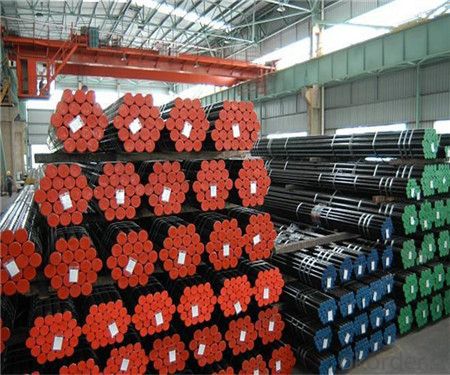
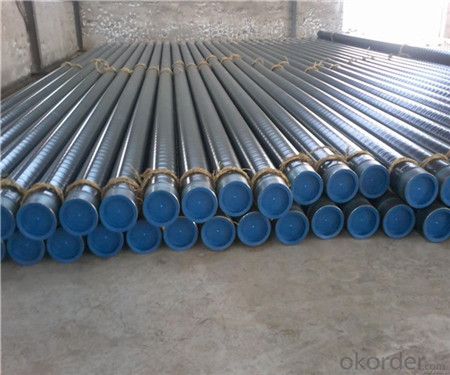
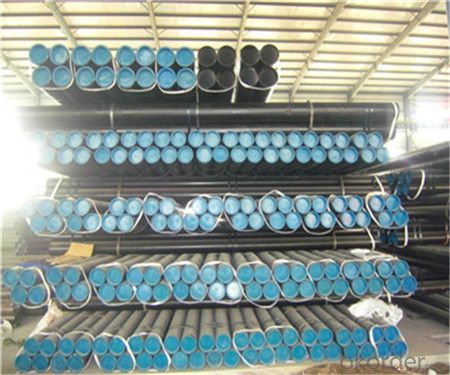
- Q: Can steel pipes be used for underground stormwater drainage?
- Indeed, underground stormwater drainage can utilize steel pipes. These pipes possess durability and boast a high strength-to-weight ratio, rendering them appropriate for subterranean usage. They can endure substantial burdens and fend off corrosion, thus guaranteeing sustained effectiveness within stormwater drainage systems. Furthermore, steel pipes lend themselves to easy welding, facilitating customization and flexibility during both design and installation. Nonetheless, it is imperative to implement adequate corrosion protection measures, such as the application of a protective coating or the utilization of corrosion-resistant alloys, to avert degradation over time. Regular maintenance and monitoring are also advisable to uphold the pipes' integrity and ensure optimal stormwater drainage functionality.
- Q: How are steel pipes used in the manufacturing of wastewater treatment systems?
- Steel pipes are commonly used in the manufacturing of wastewater treatment systems due to their durability, strength, and resistance to corrosion. They are used for various purposes such as transporting wastewater from one unit to another, constructing storage tanks and pipelines, and supporting the infrastructure of the treatment plants. Steel pipes are able to withstand the harsh conditions of wastewater environments, ensuring long-lasting and reliable performance of the treatment systems.
- Q: What is the role of steel pipes in the mining and extraction of minerals?
- The mining and extraction of minerals heavily rely on steel pipes, which have a vital role to play. These pipes are extensively utilized in diverse mining operations for the transportation of fluids like water and slurry. Moreover, they are employed to offer structural reinforcement and ventilation within underground mines. A fundamental application of steel pipes in mining is the transportation of water and slurry. Water is an essential component in the mining process, serving purposes such as dust suppression, ore processing, and site rehabilitation. The creation of a pipeline network using steel pipes enables the efficient transfer of water from its source, such as a reservoir or dam, to various areas within the mine. Similarly, slurry, a mixture of crushed minerals and water, is frequently conveyed through steel pipes to processing plants or tailings dams. Structural support is another critical function fulfilled by steel pipes in underground mines. The extraction of valuable mineral deposits necessitates the construction of tunnels and shafts. To endure the immense pressure exerted by the surrounding rock and prevent collapses, these underground excavations require reinforcement. Steel pipes, acting as support structures like roof bolts and rock bolts, strengthen the walls and roofs of these tunnels and shafts, thereby ensuring miner safety and maintaining the stability of the mine structure. Furthermore, steel pipes are employed in ventilation systems within underground mines. Proper ventilation is vital for mining operations, ensuring a continuous supply of fresh air, removal of harmful gases, and control of temperature and humidity levels. Steel pipes are utilized to create ventilation shafts and ducts, facilitating the smooth flow of air throughout the mine. This aids in preventing the accumulation of toxic gases, dust, and excessive heat, thereby maintaining a safe and healthy working environment for miners. To summarize, steel pipes are indispensable for the mining and extraction of minerals. They facilitate the transportation of fluids, offer structural reinforcement in underground mines, and contribute to efficient ventilation systems. The absence of steel pipes would significantly impede the efficient and safe extraction of minerals from mines.
- Q: How much is the wall thickness standard of building 48?
- According to the "construction of fastener type steel pipe scaffold safety technical specifications JGJ130-2011" stipulates that the specification of steel pipe should be Phi 48.3 * 3.6, that is, wall thickness is 3.6mm.
- Q: How do steel pipes handle seismic expansion joints?
- Steel pipes handle seismic expansion joints by allowing for movement and flexibility. These pipes are designed to withstand the forces caused by seismic activity, such as earthquakes, by accommodating expansion and contraction without causing damage to the overall structure. The joints in steel pipes are often equipped with specialized components, such as bellows or flexible couplings, that can absorb the movement and prevent excessive stress on the pipeline. This ensures the integrity and safety of the pipeline system during seismic events.
- Q: What are the different types of steel pipe hangers?
- There are several different types of steel pipe hangers that are commonly used in various industries and applications. These hangers are designed to support and secure pipes, ensuring proper alignment and preventing sagging or movement. 1. Clevis Hangers: Clevis hangers consist of a clevis, which is a U-shaped metal bracket, and a threaded rod that connects the clevis to the supporting structure. This type of hanger allows for vertical adjustment and is often used in suspended piping systems. 2. Split Ring Hangers: Split ring hangers are circular metal rings that are split on one side. They can be easily opened and closed around the pipe, providing a secure hold. Split ring hangers are commonly used for suspending horizontal pipes. 3. Beam Clamps: Beam clamps are designed to attach to structural beams or channels, providing a secure mounting point for pipe hangers. They come in various designs, including top flange, bottom flange, and side mount, to accommodate different installation needs. 4. Swivel Hangers: Swivel hangers are used to support pipes that may experience thermal expansion or contraction. These hangers allow the pipe to move horizontally while still providing support and preventing excessive stress on the connections. 5. Riser Clamps: Riser clamps are used to support vertical pipes or risers. They typically consist of a metal band that wraps around the pipe and a threaded rod that connects the band to the supporting structure. 6. Pipe Roller Supports: Pipe roller supports are used in applications where pipes need to move horizontally due to expansion or contraction. These hangers consist of a series of rollers that allow the pipe to move freely while still providing support. 7. Pipe Saddles: Pipe saddles are U-shaped brackets that wrap around the pipe, providing support on both sides. They are often used in applications where pipes need to be secured to walls or other structures. These are just a few examples of the different types of steel pipe hangers available. The specific type of hanger used will depend on factors such as pipe size, weight, location, and required movement allowance. It is important to choose the appropriate hanger for each application to ensure proper support and functionality of the piping system.
- Q: What is the hardness of steel pipes?
- The hardness of steel pipes can vary depending on the specific grade and manufacturing process. Generally, steel pipes are made from alloys that provide a combination of strength and toughness. To determine the hardness of steel pipes, various methods such as Rockwell or Brinell hardness tests can be conducted. These tests measure the resistance of the steel to indentation or penetration by a standardized indenter. The hardness of steel pipes is typically expressed as a numerical value on a scale, such as the Rockwell hardness scale (e.g., HRC or HRB) or the Brinell hardness scale (e.g., HB). The hardness of steel pipes is important as it indicates their ability to withstand physical stresses, such as pressure, impact, or wear, in various applications such as construction, oil and gas transportation, and manufacturing.
- Q: How are steel pipes protected against microbial corrosion?
- Steel pipes are protected against microbial corrosion through various methods. One common method is the use of coatings on the pipe's surface. These coatings act as a barrier between the steel and the surrounding environment, preventing the entry of microbes and their corrosive byproducts. Coatings such as epoxy, polyethylene, and fusion bonded epoxy are often applied to the pipes to provide this protection. Another method is the use of corrosion inhibitors. These inhibitors are added to the fluid flowing through the pipe to inhibit microbial growth and prevent corrosion. These inhibitors can be organic or inorganic compounds that work by either killing the microbes or inhibiting their metabolic activity. Additionally, proper maintenance and cleaning of the pipes are crucial in preventing microbial corrosion. Regular inspections and cleaning can help remove any biofilms or microbial deposits that may have formed on the pipe's surface. This reduces the potential for microbial corrosion and extends the lifespan of the pipes. In some cases, cathodic protection may also be employed. This involves the use of sacrificial anodes or impressed current systems to provide a protective electrical current to the pipe. This current helps to prevent the formation of corrosive microorganisms and protects the steel from corrosion. Overall, a combination of coatings, corrosion inhibitors, regular maintenance, and cathodic protection techniques are used to protect steel pipes against microbial corrosion. These strategies help to ensure the longevity and integrity of the pipes in various industries, such as oil and gas, water supply, and sewage systems.
- Q: What is the maximum temperature that steel pipes can handle?
- The maximum temperature that steel pipes can handle depends on the specific grade of steel being used. However, most common steel pipes can withstand temperatures up to around 1000 degrees Celsius (1832 degrees Fahrenheit) without significant structural damage.
Send your message to us
Seamless steel pipe good quality16mn 20# GB5310
- Loading Port:
- Tianjin
- Payment Terms:
- TT or LC
- Min Order Qty:
- 20 m.t.
- Supply Capability:
- 9000 m.t./month
OKorder Service Pledge
OKorder Financial Service
Similar products
Hot products
Hot Searches
Related keywords


